Diving For People Without Experience
Exploring the underwater world without prior experience can be both daunting and exhilarating. Imagine hovering over a kaleidoscope of colors, surrounded by curious marine creatures. The initial moments of uncertainty give way to a sense of wonder and tranquility as one delves into the depths.
But what does it take for a novice to venture into this aquatic realm? Stay tuned to uncover the essential tips and insights that will guide beginners on their journey to becoming confident divers, embracing the unknown with each submersion.
Key Points
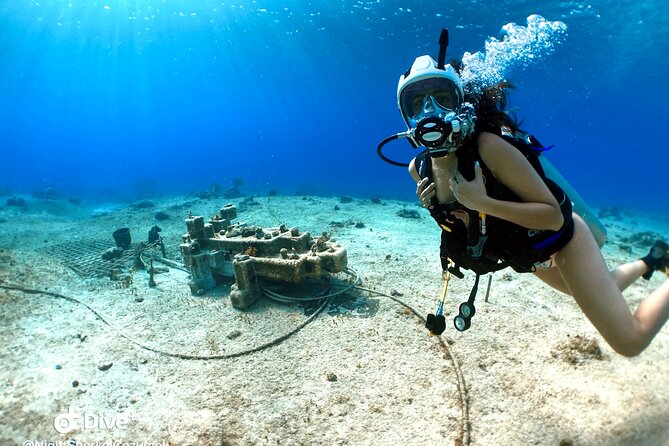
- Beginners can enjoy scuba diving with proper training and equipment.
- Focus on mastering buoyancy, breathing, and safety measures.
- Dive in suitable locations with vibrant marine life for a fulfilling experience.
- Experience physical and mental benefits while exploring the underwater world.
Here's some more nearby activities we've reviewed
Preparation Before Diving
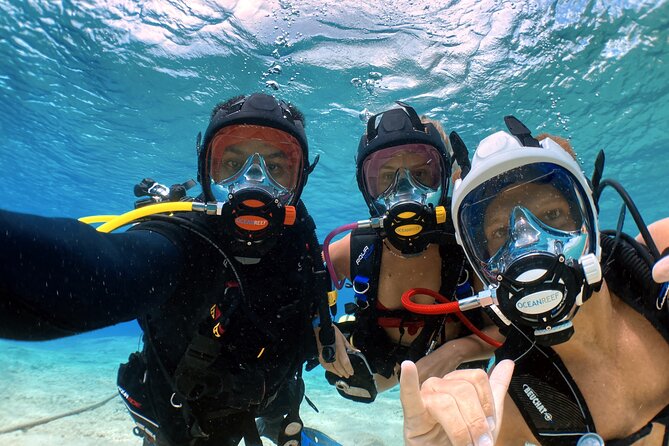
Before embarking on a diving adventure, beginners should ensure they meet the participant requirements and have no serious medical conditions that could affect their experience underwater. Proper equipment selection is crucial for a safe and enjoyable dive.
Beginners must familiarize themselves with the breathing techniques necessary to conserve air and move efficiently underwater. A thorough pre-dive briefing is essential to understand the dive plan, hand signals, emergency procedures, and potential hazards.
Plus, following the buddy system is a fundamental rule in diving to ensure mutual safety and assistance during the dive. By paying attention to these key aspects of preparation, beginners can set themselves up for a successful and memorable diving experience.
Safety Measures to Follow
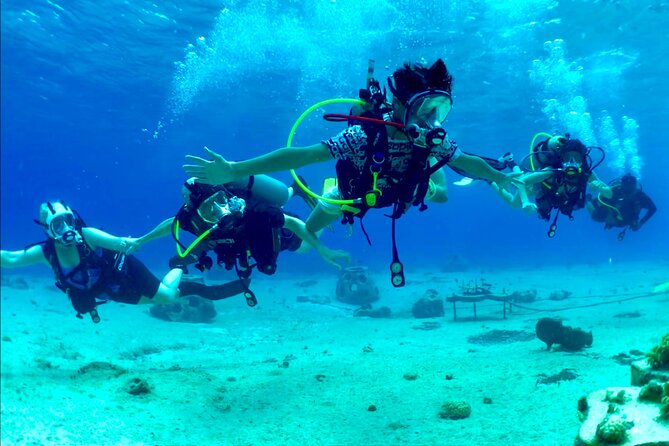
To ensure a safe diving experience, beginners must adhere to essential safety measures throughout their underwater adventure.
When diving without experience, it’s crucial to follow specific safety precautions and select the appropriate equipment for the dive. Beginners should familiarize themselves with emergency procedures before submerging and ensure they can communicate effectively with their diving buddy or instructor while underwater.
Safety measures such as checking equipment functionality, maintaining proper buoyancy, and equalizing ear pressure regularly are vital for a successful and secure dive.
Understanding how to respond to emergencies and effectively communicate underwater will contribute to a smooth and enjoyable diving experience for those new to the underwater world.
What to Expect Underwater
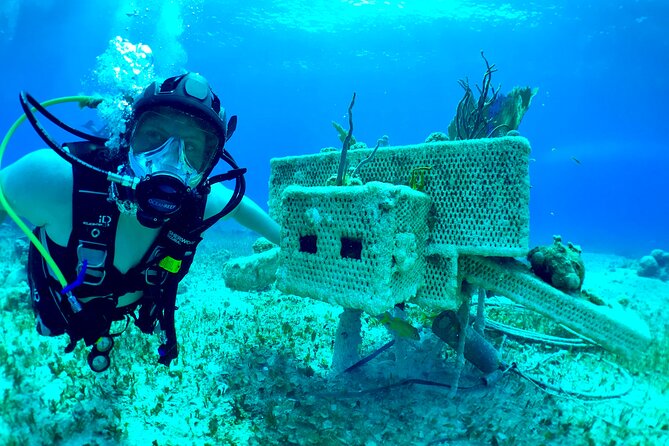
Entering the underwater realm as a beginner diver unveils a mesmerizing world filled with vibrant marine life and captivating sights. As one descends beneath the surface, they can expect:
-
Underwater wildlife encounters: Prepare to come face to face with colorful fish, graceful sea turtles, and maybe even a curious octopus.
-
Diving gear essentials: Feeling the weightlessness and freedom provided by the scuba gear adds to the excitement and enhances the diving experience.
-
Breathing techniques: Mastering controlled breathing is key to conserving air and staying calm underwater, allowing for a longer and more enjoyable dive.
Remember to keep these experiences in mind as you gear up for your underwater adventure!
Tips for Beginner Divers
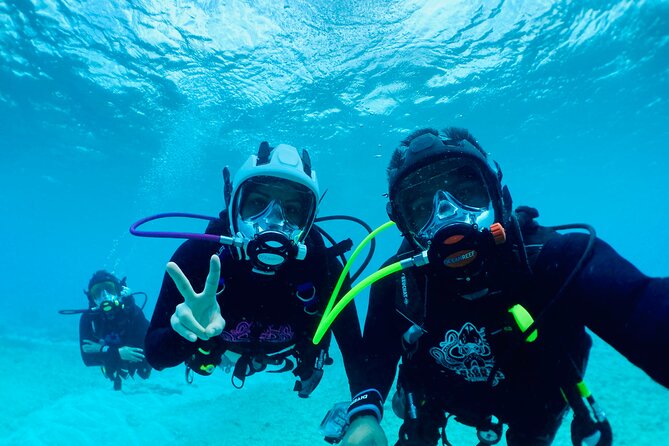
When embarking on their diving journey, beginner divers should prioritize mastering proper buoyancy control to enhance their underwater experience. Proper buoyancy allows divers to move effortlessly underwater, conserving energy and preventing accidental damage to the marine environment.
When selecting equipment, beginners should ensure a comfortable fit and understand its functions for a safe dive. Choosing suitable dive locations with calm waters and abundant marine life can make the experience more enjoyable.
Learning effective breathing techniques is crucial for conserving air and staying calm underwater. Beginner divers may encounter a variety of underwater wildlife, so respecting their environment and maintaining a safe distance is essential.
Benefits of Diving for Beginners
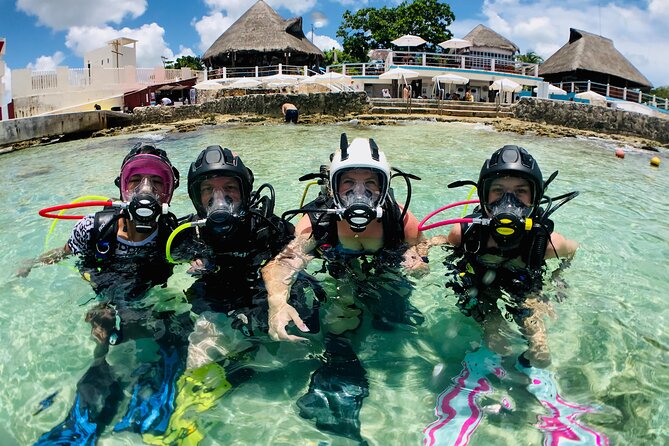
Embarking on a diving journey as a beginner offers a gateway to a whole new world beneath the surface, providing a unique opportunity for exploration and discovery. Diving for beginners brings forth a range of benefits that extend beyond just the thrill of the underwater world.
Here are three key benefits to consider:
- Health benefits: Diving can improve cardiovascular health, increase flexibility, and strengthen muscles.
- Mental relaxation: The peaceful underwater environment can help reduce stress and promote mental well-being.
- Exploration and discovery: Discovering the underwater ecosystem and encountering marine life can be incredibly rewarding and awe-inspiring.
These benefits make diving an appealing activity for beginners looking to explore a new and exciting experience.
Common Mistakes to Avoid
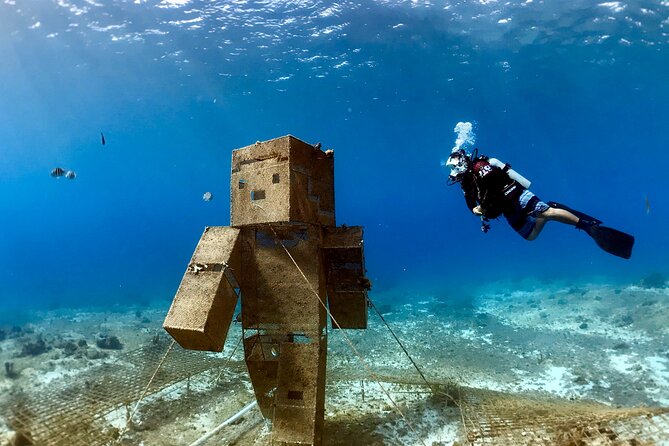
To maximize your diving experience as a beginner, steer clear of these common mistakes. When it comes to equipment selection, avoid choosing gear without proper guidance or using equipment that doesn’t fit correctly. It’s crucial to ensure you have the right mask, fins, wetsuit, and buoyancy control device for a safe and enjoyable dive. Plus, mastering proper breathing techniques is essential. Beginners often make the mistake of breathing too fast, too shallow, or holding their breath underwater. Remember to breathe slowly, deeply, and continuously to conserve air and reduce the risk of lung injuries. By paying attention to equipment selection and breathing techniques, you can enhance your diving skills and have a fantastic underwater experience.
| Equipment Selection | Breathing Techniques | Common Mistakes to Avoid |
|---|---|---|
| Choose gear with guidance | Practice slow, deep breathing | Avoid ill-fitting equipment |
| Ensure gear fits correctly | Avoid holding breath underwater | Don’t breathe too fast or shallow |
| Have the right mask, fins, wetsuit | Breathe continuously | Neglect proper breathing technique |
Post-Dive Care Instructions
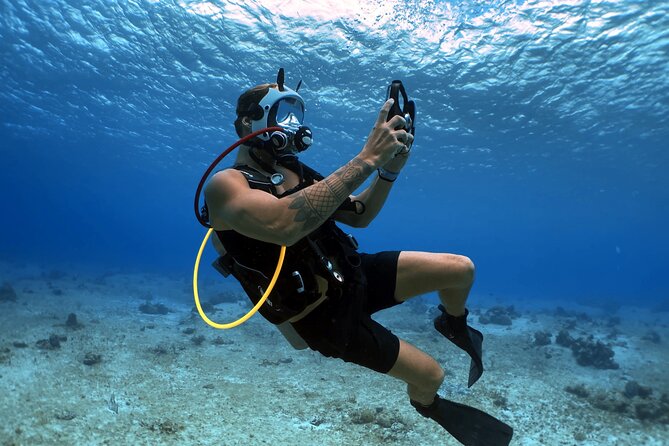
After ensuring proper equipment selection and mastering breathing techniques, it’s important to attend to post-dive care instructions to ensure a safe and comfortable experience.
Here are three essential post-dive care instructions to keep in mind:
-
Post Dive Relaxation: Encourage relaxation post-dive to help the body recover. Relaxing activities like gentle stretching, deep breathing, or a soothing shower can aid in reducing muscle tension and promoting overall well-being.
-
Dive Equipment Maintenance: Properly clean and store your dive equipment to ensure its longevity and functionality for future dives. Rinse gear thoroughly with fresh water, allow it to dry completely, and store it in a cool, dry place away from direct sunlight to prevent damage.
-
Hydration and Nutrition: Replenish your body with water and nutrient-rich foods to support recovery and maintain energy levels after diving. Staying hydrated and nourished is crucial for overall health and well-being.
Common questions
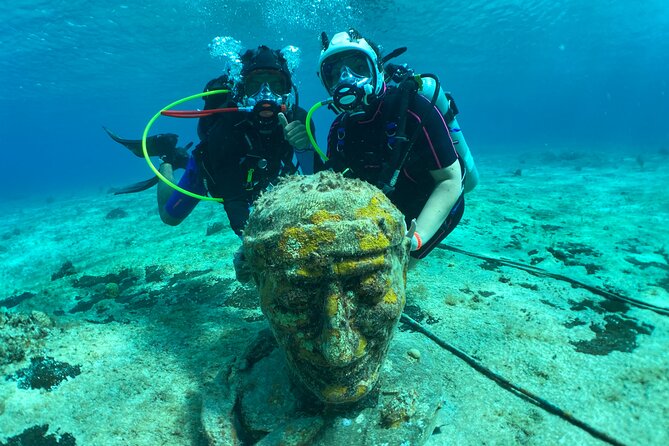
For those considering their first dive, understanding common queries can help build confidence and ensure a smooth introduction to the world of diving. Below are some frequently asked questions that beginners often have before embarking on their diving adventure:
| FAQs | Answers |
|---|---|
| Dive equipment | What gear is essential for a beginner diver? |
| How can one ensure the equipment fits properly? | |
| Dive locations | Where are some popular beginner-friendly dive sites? |
| Are there any locations suitable for first-time divers near home? |
These questions touch on crucial aspects like the necessary equipment for diving and suitable locations for beginners to explore the underwater world safely.
Here's a few more nearby tours and experiences we have reviewed.
Common questions
Can I Wear Contact Lenses While Diving?
While diving, you can wear contact lenses, but it’s essential to consider diving safety and risks. Factors such as underwater visibility and clarity should be taken into account to ensure a comfortable and safe diving experience for all participants.
Are There Any Age Restrictions for Beginner Divers?
For beginner divers, safety concerns are paramount. Training programs typically have age restrictions to ensure readiness and competence. It’s crucial to follow guidelines to guarantee a safe and enjoyable diving experience for all participants.
Can I Bring My Own Diving Equipment or Is It Provided?
Participants can bring their own diving equipment if preferred. Safety protocols ensure gear compatibility and suitability. Rental options are available for those without gear. Divers should adhere to guidelines for a safe and enjoyable experience.
Is It Common to Experience Seasickness While Diving?
Seasickness can affect divers. To prevent motion sickness, avoiding heavy meals before diving can help. Underwater, equalization techniques like gently blowing through the nose while pinching can help adjust pressure in the ears.
Are There Any Specific Dietary Restrictions to Follow Before Diving?
Pre dive nutrition plays a crucial role in ensuring a successful diving experience. Maintaining a balanced diet and staying hydrated are essential. Avoid heavy meals before diving, opt for light, easily digestible foods, and drink plenty of water to stay hydrated throughout the activity.
Here's more of our most recent tour reviews happening neaby
- Mayan Village and Tequila Tour
- Open Water Course Cozumel
- 2 Tank Cozumel Reef Boat Dives
- Half Day Private Fishing Charter in Cozumel
- Private Cozumel Jeep Tour & Jade Caverns Cenote: All-Inclusive
- Lagoon 39ft Private Catamaran Sail and Snorkel 4hr National Park
- ATV Seashore Combo: Adventure to Mezcalitos Plus Optional Snorkeling at Playa Uvas
- XRAIL Adventure to Jade Cavern Private Vehicle up to 4 Guests Including Transfer
- Quintana Roo Chocolate Making Workshop Class – Cozumel
- Cozumel Private Snorkeling and Charter Experience
- The Original Cozumel Zipline Adventure
Last Words
To sum it up, diving for people without experience opens up a whole new world of wonder and excitement beneath the waves. By following safety measures, knowing what to expect, and embracing the benefits of diving, beginners can enjoy a fulfilling and memorable underwater experience.
Remember to avoid common mistakes, take care of yourself post-dive, and always stay curious and respectful of the ocean’s mysteries. Happy diving!